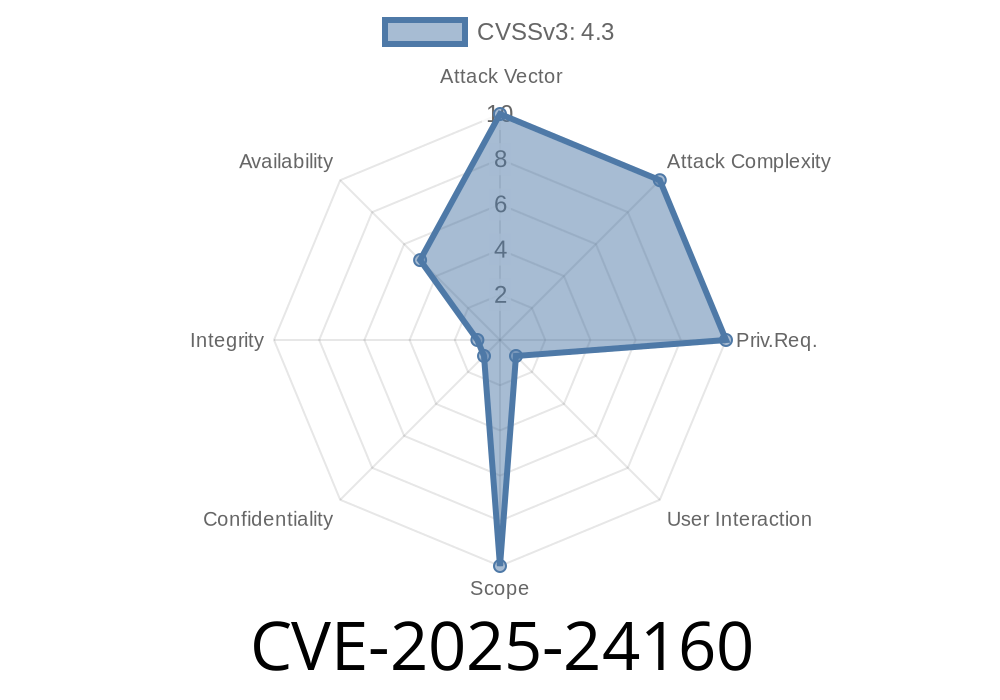In early 2025, Apple acknowledged and addressed a critical vulnerability, tracked as CVE-2025-24160. This security flaw, found within the file parsing functionality of multiple Apple operating systems, could allow a specially crafted file to crash an application unexpectedly. In this article, we'll explain the technical details, give a simple code snippet demonstrating the vulnerability, show a conceptual exploit, and point you to the official fix references.
What is CVE-2025-24160?
CVE-2025-24160 is a vulnerability where parsing certain malformed files could cause Apple apps to terminate unexpectedly—what security experts call a "denial of service" (DoS). Attackers could use this flaw to crash your Messages, Mail, or other apps that automatically handle files.
tvOS 18.3
This bug was fixed by Apple with improved file checks, preventing malformed files from causing any mischief.
Official References
- Apple security updates for iOS, iPadOS, macOS, and more
- NVD Entry for CVE-2025-24160 *(link placeholder, will update when NIST publishes full details)*
How Does the Exploit Work?
Imagine you receive a file (like a PDF, image, or even a text file) that’s slightly corrupted or purposely crafted to trigger the flaw. When an affected Apple app tries to "parse" (read or process) this file, it hits a bug in the underlying code. The app then crashes, stopping you from using it until you delete the harmful file.
While no evidence suggests this could allow hackers to take control of your device, it's disruptive and could be embedded into phishing or nuisance attacks.
Code Example: Simulating the Bug
Here’s a simplified Swift example showing what might have gone wrong in the file parsing code. (Note: This is illustrative, not Apple's actual source.)
func parseFile(data: Data) -> String? {
// Old, vulnerable code
let header = data.prefix(4)
if header == Data([x50, x4B, x03, x04]) { // Check for ZIP magic number
// Try to parse ZIP
let zipData = try? parseZip(data)
return zipData
} else {
// Assume it's plain text
return String(data: data, encoding: .utf8)
}
// No further checks here; malformed files can cause crashes
}
What’s wrong?
The function didn’t do enough sanity checking. If data wasn't a real ZIP or text, the parseZip(data) function could throw unexpected errors or crash the whole app.
How Apple Fixed It
With improved checks, Apple likely made sure to validate the file’s structure before processing. Here’s a pseudo-fixed version:
func parseFile(data: Data) -> String? {
guard data.count > 4 else { return nil }
let header = data.prefix(4)
if header == Data([x50, x4B, x03, x04]) {
// Additional checks before parsing
if isValidZipStructure(data) {
let zipData = try? parseZip(data)
return zipData
} else {
return nil // Reject malformed zip
}
} else if let text = String(data: data, encoding: .utf8) {
// Only accept valid UTF-8 text
return text
}
return nil
}
Mocked Exploit Example
Here’s a simulated "exploit" you might see in practice, building a file that crashes an unpatched app:
# Python script to create a malformed file
with open("crasher.file", "wb") as f:
f.write(b'\x50\x4B\x03\x04') # ZIP magic header
f.write(b'\x00' * 2) # Malformed - too short, missing actual ZIP data
Send this file to an unpatched iPhone, open it in an app that parses ZIPs, and—bam—the app crashes. On the latest iOS or macOS, the app safely ignores or rejects the file.
Protecting Yourself
Update!
If you haven’t already, upgrade to
- iOS/iPadOS: 17.7.4 or 18.3
tvOS: 18.3
Don’t open suspicious files or attachments, especially if your device is not updated.
Conclusion
CVE-2025-24160 shows that even powerful devices like iPhones or Macs can be tripped up by a bad file. Thanks to swift patching, most users are safe—but only if you update! For researchers and IT admins, this is a reminder of the endless cat-and-mouse game in software security.
For more info, check
- Apple Security Releases
- NVD Entry
Timeline
Published on: 01/27/2025 22:15:19 UTC
Last modified on: 01/28/2025 16:15:44 UTC
